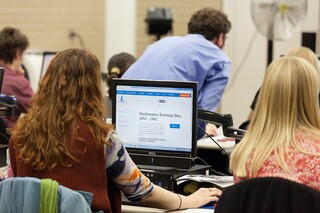
A new project from the United States Holocaust Memorial Museum is sending students and teachers around the country to their local libraries in an effort to understand how the U.S. press reported on the Holocaust—and how the event was understood by Americans around the country.
is part of a new museum initiative focused on Americans and the Holocaust. The museum will mark its 25th anniversary with an exhibit on the topic, opening in 2018.
So far, the museum has received more than 1,000 articles from 48 states. (Hawaii and Vermont students and teachers, there’s still a chance to be first from your state!) The museum hopes to eventually collect articles from 50 percent of the newspapers published during the 1930s and 1940s.
The History Unfolded website lists several key events, including the Nazi boycott of Jewish businesses and the first reports on “extermination camps,” and allows participants to upload articles about those events from local newspapers.
In a press release, Michael J. Abramowitz, the director of the museum’s Levine Institute for Holocaust Education, said that the project’s goal is “for contributors to explore Holocaust history as both an American story and a local story...We expect that some will be excited about using primary sources in historical research, but we also hope, through their involvement, people will challenge assumptions about what Americans knew about the events that came to be known as the Holocaust.”
Another goal: to get students, teachers, and others involved in “citizen history,” which Elissa Frankle, the Digital Projects Coordinator, Digital Learning and New Media at the Levine Institute describes as a relationship between participants and the museum. “They bring a lot to the table, and in return, we give them an amazing experience...of having contributed to real research.”
While some scholars have studied major newspapers’ coverage of the Holocaust, there is no resource that has pulled together local newspapers’ pieces over time, Frankle said.
David Klevan, the museum’s outreach specialist, said that the project is well-suited to high school-age students, but that college and middle school students have gotten involved, too.
He said the project can make history, including the Holocaust, seem more real. Instead of being presented with a prearranged set of “primary sources,” students are unearthing articles on their own.
One unexpected difficulty: While constructing the project, museum staff realized that many younger students have little to no experience interacting with print newspapers. The museum created a resource—" — to help students navigate headlines, bylines, page jumps, and more.
“We know it’s a huge ask,” Klevan said. In places where newspaper archives have not yet been digitized, he said, “you have to trek over to the library, teach students how to use microfilm, and go back to the school.”
But, he said, looking at those primary source documents allows students to learn more about the history of their communities, including what people in them knew about an event that was happening thousands of miles away. “It’s a unique opportunity to take what most people think of as this faraway, global event of enormous magnitude and say, ‘No, my local community had a place in this,’ ” he said.
The project has already unearthed some surprising and interesting news stories: One Fredericksburg, Va., newspaper reported about an event held in sympathy for the Jewish people at a local church; a Wisconsin newspaper reported that a man historians believed to have survived the Holocaust had been shot.
The resources created through History Unfolded may eventually become part of the museum’s 2018 exhibit on Americans and the Holocaust, and will be accessible to professional and amateur historians.
The Holocaust Museum also offers .
Photo 7 December 2015, History Unfolded event participants research archival newspaper articles at DC’s MLK Library for the Citizen History Project. / U.S. Holocaust Memorial Museum
Related stories: